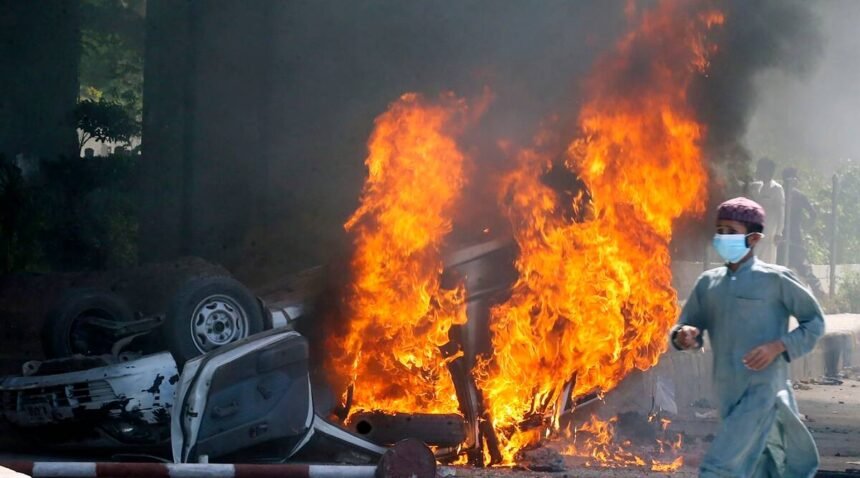Pakistan’s cabinet, on Saturday, gave its endorsement to the decision made by the country’s top security body to conduct trials by military courts for individuals involved in attacks on crucial army installations. The move comes in the wake of widespread protests that erupted on May 9 following the arrest of former prime minister and Pakistan Tehreek-e-Insaf (PTI) party chairman, Imran Khan. The demonstrations quickly turned violent, with protestors setting fire to military and civilian buildings and vehicles, resulting in a devastating toll of 10 fatalities and leaving thousands injured.
The decision to hold military trials signifies a concerted effort by the Pakistani government to address the escalating threats posed by attacks on key army installations. Such attacks have not only endangered the lives of military personnel but have also shaken the nation’s security apparatus. With the cabinet’s endorsement, the government aims to send a strong message that it will take decisive action against those responsible for such acts of violence.
The protests that unfolded in the aftermath of Imran Khan’s arrest were marked by an alarming level of aggression. What started as a demonstration against the detention of the former prime minister soon spiraled into a violent outburst, as protestors took to the streets and engaged in destructive activities. The wanton acts of arson targeting military and civilian buildings, as well as vehicles, caused significant damage and led to a tragic loss of life. The scale of the violence and the resulting casualties underscored the gravity of the situation and the urgent need for a swift response from the authorities.
By supporting the use of military courts to try those involved in attacks on army installations, the Pakistani government aims to ensure a robust and efficient legal mechanism for dealing with such cases. Military courts have been employed in the past to address similar security challenges faced by the country. Their establishment allows for expedited proceedings and a focused approach in dealing with individuals implicated in acts of terrorism and violence against the armed forces. However, it is important to note that the use of military courts for civilian cases has been a subject of debate and controversy, with concerns raised about due process and the potential infringement of civil liberties.
While the cabinet’s endorsement of military trials is a significant step, it is imperative that the government also focuses on addressing the root causes of the protests that triggered the violence. The arrest of Imran Khan, a prominent political figure, ignited widespread discontent among his supporters, leading to the eruption of protests across the country. To prevent such incidents from recurring, it is crucial to engage in meaningful dialogue and address the grievances and concerns of all stakeholders. Only through inclusive and transparent processes can long-term stability and harmony be achieved.
The recent wave of violence and its aftermath serve as a stark reminder of the complex challenges faced by Pakistan in maintaining law and order, as well as safeguarding national security. It is crucial for the government to strike a delicate balance between ensuring the swift dispensation of justice and upholding the principles of fairness and due process. While military trials may offer expediency in certain cases, it is important to exercise caution and ensure that fundamental rights and legal safeguards are upheld throughout the proceedings.
As Pakistan moves forward in addressing the aftermath of the violent protests, the government must demonstrate its commitment to fostering a peaceful and inclusive society. This entails not only holding those accountable for their actions but also working towards resolving underlying political tensions through dialogue and inclusive governance. The challenge lies in finding a sustainable solution that not only upholds the rule of law but also promotes unity and stability for the nation as a whole.




